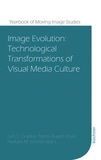

Yearbook of Moving Image Studies (YoMIS)Image Evolution
Pagine: 225
The history of images can be described as a history of technology and mediality. The development of images is deeply rooted in the potentials of media technologies and the numerous human inventions in the range of traditional craftsmanship, engineering science, computer science, and art and design.
The factual embedding of images in the historical-technological processes constitutes a complex structure of an autonomous "image evolution" that must be highlighted, characterized and analyzed by the interdisciplinary academic discourses that are related to the functions and structures of visuality, pictoriality, and forms of multi-sensoric representations.
The chosen term "evolution" is deliberately indicating structural laws that underlie historical events. These laws are intentional and logical processes of a historical and technological interdependency. In this interdependency, technology is evolving out of its inherent structures and additionally embedded in anthropological conditions and sociocultural dynamics. In this context, we should work with the concept of an "image evolution".Prof. Dr. Lars C. Grabbe studierte Philosophie, Soziologie und Neue Deutsche Literaturwissenschaft und Medienwissenschaften an der Christian-Albrechts-Universität zu Kiel. 2011 promovierte er an der Technischen Universität Chemnitz zu "Georg Simmels Objektwelt. Verstehensmodelle zwischen Geschichtsphilosophie und Ästhetik." Ab 2010 war er Lehrbeauftragter für "Theorie und Geschichte symbolischer Formen" am Institut für Kunst-, Design- und Medienwissenschaften der Muthesius-Kunsthochschule in Kiel. 2014 wechselte er zudem an den Fachbereich Design der Fachhochschule Münster als Dozent für Medientheorie und Kommunikation. Dort ist er seit Juni 2017 Professor für Theorie der Wahrnehmung, Kommunikation und Medien. Forschungsschwerpunkte: Phänosemiose, Medientheorie und -philosophie, Bildwissenschaft, Wahrnehmungstheorie, Kommunikationstheorie, Ästhetik, Filmwissenschaft.
Pubblicato da: Büchner-Verlag
Come funziona?
Crea un account.
Crea il tuo account gratuito qui.
Scarica l'app Voxa
Disponibile per Android e iPhone su Google Play o su App Store.
Prova gratuita per 7 giorni
Hai accesso a 100.000 titoli e all'intera esperienza Voxa.
Ascolta offline
Scarica i tuoi audiolibri preferiti e goditeli anche senza connessione a Internet.

